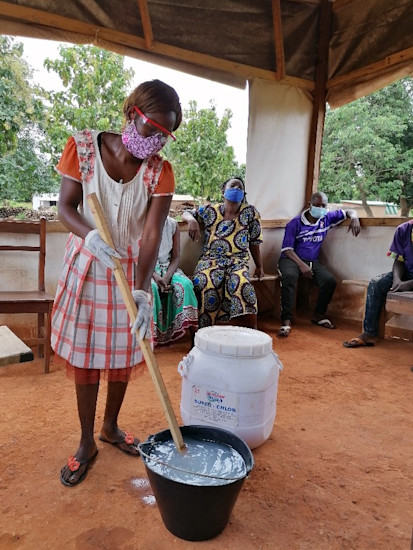
Joining forces in the fight against COVID-19
Since the first case of COVID-19 was recorded in March 2020, the Central African Republic (CAR) has recorded 5,036 confirmed cases; including 63 deaths (as of 11 March 2021). Faced with this emergency, the NGO Concern Worldwide immediately adapted two of its current projects and launched two new projects, in collaboration with other NGOs, along the roads connecting the capital of the Central African Republic, Bangui, to the Cameroon city of Douala – a region which was most affected by the pandemic. 400,000 people across western CAR will benefit from this robust NGO mobilization.
Strengthening health centers
Before the country was hit by the pandemic, Concern Worldwide was already working with 13 health centers in Ombella M’Poko and Lobaye, thanks to funding from Irish Aid, by strengthening their capacities to deal with malnutrition, especially among children. With the arrival of COVID-19, the NGO quickly trained health workers, based in these centers, on how to prevent and control infection and provided the centers with protective equipment, hand washing devices and materials for cleaning and disinfection, as well as communication materials to sensitize the community on barrier actions against the virus.
Since July, this same approach has been extended to 62 other health centers, thanks to two new financial projects by the Bureau for Humanitarian Assistance of the United States Agency for International Development (USAID BHA) and the United Nations Children’s Fund (UNICEF). These health centers are located along the main roads of the prefectures of Ombella M'Poko, Ouham, Ouham-Pendé, Nana-Mambéré and Mambéré-Kadéï in the west of the country, which lead to Cameroon – CAR's main trading partner.
Joint efforts
The BHA-funded project is being implemented as a consortium alongside the NGOs International Medical Corps (IMC), Danish Refugee Council (DRC) and Oxfam, which are coordinating their efforts to fight the spread of the pandemic, in support of the Ministry of Health and Population.
As access to water and adequate sanitation infrastructure is essential in the fight against the spread of the pandemic, additional support will be provided under the project financed by UNICEF to construct 30 latrines and rehabilitate 20 water points among the 62 health centers which are to be supported.
Involving the community
To provide essential information on the risks and prevention of COVID-19, the NGO relies on community intermediaries (RECO) and mothers, called ‘Mothers of Enlightenment’ in order to reach communities, including isolated villages, and to support the epidemiological surveillance in these communities. RECOs and the Mothers of Enlightenment act as role models in the community, motivating others to adopt good practices to reduce the risk of transmission. This approach has been used for several years already in the context of projects targeting health centers. Around 100 RECOs and more than 600 Enlightened Moms work with more than 13,000 families every day, in their respective areas, in order to improve hygiene, health and nutrition practices. In April and May, these RECOs and Mothers of Enlightenment were trained on the prevention of COVID-19 and equipped with protective and didactic material for awareness raising. As part of the two new projects to fight COVID-19, 400 additional people are also being trained as RECOs, and will then go on to support the health areas of the 62 health centers.